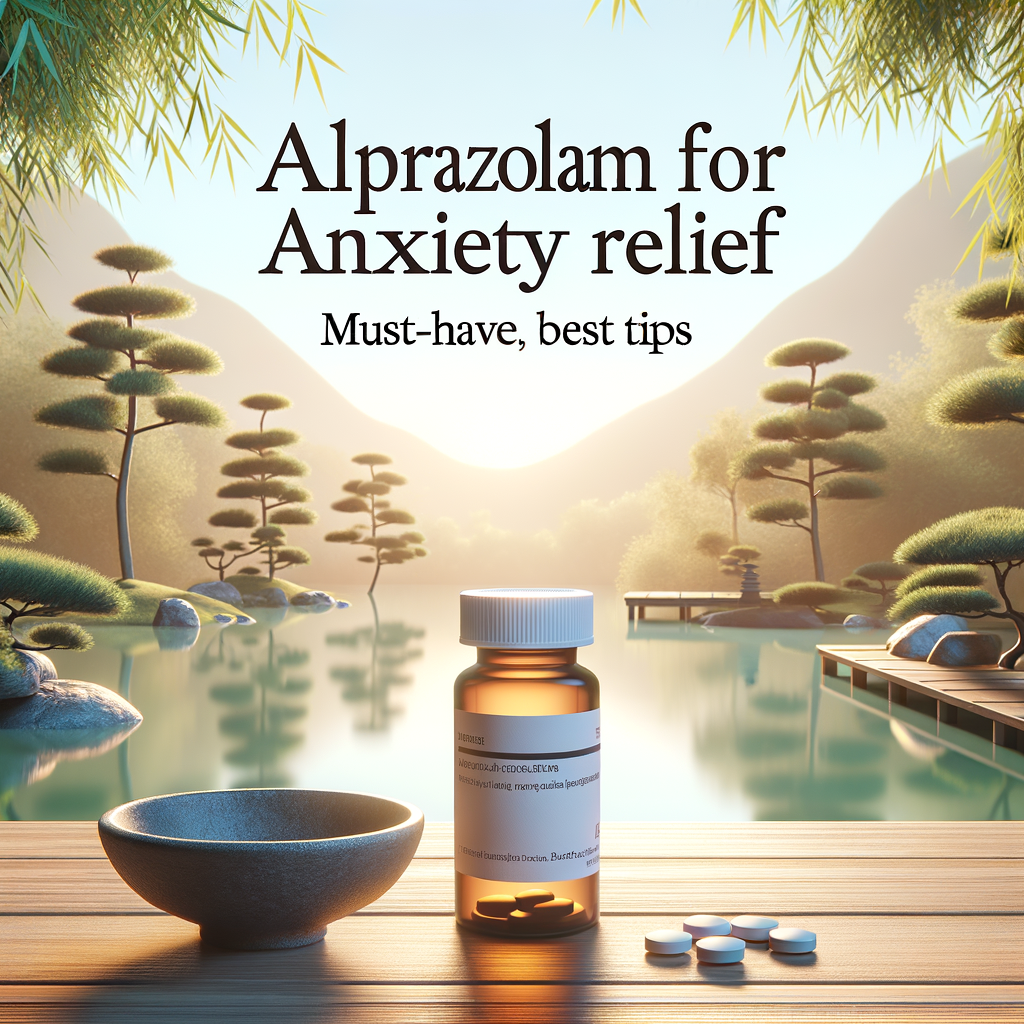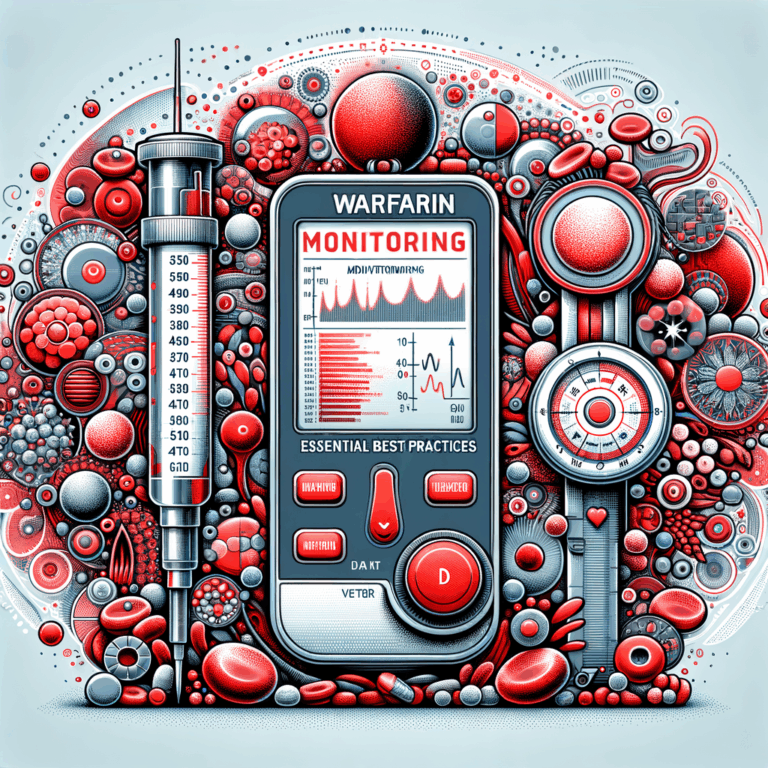
- Introduction: Why Alprazolam for Anxiety Relief Matters
- What Is Alprazolam and How It Works
- Active Ingredients and Formulations
- When Alprazolam Is Appropriate
- Clinical Guidelines and Best Practices
- Benefits: Why People Choose Alprazolam for Anxiety Relief
- Risks and Side Effects to Expect
- Common Side Effects
- Serious Side Effects
- Dosage: What to Expect and How to Take It
- Table: Typical Dosing Guide
- Tips to Maximize Benefits and Minimize Risks
- Lifestyle Habits That Complement Alprazolam
- Interactions: What Not to Mix with Alprazolam
- List: Common Interacting Substances
- Dependence, Tolerance, and Withdrawal: What to Know
- Signs of Withdrawal
- Alternatives to Alprazolam for Anxiety Relief
- Non-Drug Alternatives
- Special Populations: Children, Elderly, Pregnancy
- Pregnancy and Breastfeeding Considerations
- How to Get a Prescription and What to Expect
- Questions Your Doctor Might Ask
- Managing Side Effects and Safe Storage
- Safe Disposal Tips
- Traveling and Driving: Practical Safety Tips
- Recognizing and Preventing Misuse
- Strategies to Reduce Misuse Risk
- Combining Alprazolam with Therapy for Better Results
- How to Coordinate Care
- Practical Tips for Day-to-Day Use
- Daily Checklist
- When to Call Your Doctor or Seek Emergency Care
- Real-World Tips from Clinicians and Patients
- Common Patient Strategies
- Summary: Smart Use of Alprazolam for Anxiety Relief
- Frequently Asked Questions (FAQs)
- 1. How quickly does alprazolam start to work?
- 2. Can I drink alcohol while taking alprazolam?
- 3. How long can I safely take alprazolam?
- 4. Will alprazolam make me gain weight?
- 5. Is alprazolam addictive?
- 6. Can I stop alprazolam suddenly?
- 7. How does alprazolam compare to SSRIs for anxiety?
- 8. Can I take alprazolam during pregnancy?
- 9. What should I do if I miss a dose?
- 10. How do doctors monitor for misuse?
- Extra Questions You Might Ask (and Short Answers)
Introduction: Why Alprazolam for Anxiety Relief Matters
Anxiety can disrupt daily life. It affects work, sleep, and relationships. Many people search for quick and effective relief.
Alprazolam for Anxiety Relief ranks among widely prescribed options. It acts fast and often gives noticeable calm within hours. However, it comes with rules and risks you should know.
This article explains what alprazolam does, how to use it safely, and practical tips to optimize benefits. Read on to learn must-have advice and best practices.
What Is Alprazolam and How It Works
Alprazolam belongs to the benzodiazepine drug class. Doctors commonly prescribe it for anxiety and panic disorders. It works by enhancing GABA, a brain chemical that slows neural activity.
Consequently, people feel calmer and less tense. Symptoms like racing thoughts and physical agitation often lessen. Importantly, the drug provides short-term relief rather than a cure.
Use alprazolam under medical supervision. Your doctor should assess the correct dose and duration. That prevents misuse and reduces side effects.
Active Ingredients and Formulations
Alprazolam comes as tablets, including immediate-release and extended-release forms. Immediate-release works quickly and suits acute anxiety. Extended-release provides longer symptom control.
Generic versions are usually less expensive than brand names. Both forms contain the same active ingredient. Ask your pharmacist if a generic will work for you.
When Alprazolam Is Appropriate
Doctors prescribe alprazolam for generalized anxiety disorder and panic disorder. They might also use it short-term for severe situational anxiety. For example, before a major procedure.
Sometimes clinicians combine it with psychotherapy. This approach aims to manage symptoms early. Then therapy builds long-term coping skills.
However, doctors typically avoid long-term use. The drug can lead to tolerance, dependence, and withdrawal. Thus, it suits short-term or carefully monitored treatment.
Clinical Guidelines and Best Practices
Guidelines often recommend benzodiazepines for short-term relief only. Clinicians prefer SSRIs or therapy for long-term care. Yet, benzodiazepines can bridge symptom control while those treatments take effect.
To comply with guidelines, practitioners set clear stop dates. They also use small, effective doses. Regular follow-up helps adjust treatment and reduce risks.
Benefits: Why People Choose Alprazolam for Anxiety Relief
Alprazolam acts quickly. Many users feel relief within 30 to 60 minutes. This rapid effect helps during panic attacks and acute stress.
Additionally, the drug can reduce muscle tension and insomnia tied to anxiety. People often report improved sleep and clearer thinking. These changes can restore daily functioning.
Finally, alprazolam may reduce frequency of panic episodes when used correctly. However, benefits depend on proper dosing and medical oversight.
Risks and Side Effects to Expect
All medications carry risks. Alprazolam can cause drowsiness, dizziness, and coordination problems. These effects may impair driving and operating machinery.
Other side effects include memory issues, fatigue, and slurred speech. Less commonly, people experience mood changes and paradoxical reactions like increased anxiety. Seek medical help if you notice unusual behavior.
Long-term risks include tolerance and physical dependence. Abruptly stopping alprazolam can trigger severe withdrawal, including seizures. That outcome underscores the need for tapering.
Common Side Effects
– Drowsiness
– Dizziness
– Lightheadedness
– Headache
– Memory problems
Serious Side Effects
– Confusion or disorientation
– Respiratory depression (with other depressants)
– Severe mood swings or suicidal thoughts
– Signs of allergic reaction (rash, swelling)
Dosage: What to Expect and How to Take It
Your doctor chooses a dose based on symptoms, age, and medical history. Typical starting doses are low. Doctors then increase by small increments.
Immediate-release doses usually range from 0.25 mg to 0.5 mg. People take them two or three times daily if needed. Extended-release doses commonly start at 0.5 mg once daily.
Never change your dose without consulting your doctor. Follow the prescription label exactly. If you miss a dose, take it when you remember. However, skip it if the next scheduled dose is near.
Table: Typical Dosing Guide
| Situation | Usual Starting Dose | Frequency |
|—|—:|—|
| Generalized Anxiety (adults) | 0.25–0.5 mg | 2–3 times daily |
| Panic Disorder (adults) | 0.5 mg | 2–3 times daily; may increase |
| Extended-Release | 0.5 mg | Once daily |
| Elderly or hepatic impairment | Lower than usual | Monitor closely |
Note: This table provides general estimates. Your doctor will make precise recommendations.
Tips to Maximize Benefits and Minimize Risks
First, follow your doctor’s instructions closely. Small, consistent doses work better than high, irregular ones. Second, avoid alcohol and sedatives. Mixing increases the risk of life-threatening respiratory depression.
Also, plan how long you will use alprazolam. Short-term use limits tolerance and dependence. Additionally, use other therapies like cognitive behavioral therapy (CBT) to address root causes.
Keep a medication diary. Note times, doses, and symptom changes. This helps you and your clinician track progress. It also flags side effects early.
Lifestyle Habits That Complement Alprazolam
– Sleep well: Aim for 7–9 hours nightly. Consistent sleep reduces anxiety naturally.
– Exercise: Regular activity lowers stress hormones. Try 30 minutes most days.
– Mindfulness: Practice breathing or meditation to reduce reactivity.
– Nutrition: Balanced meals stabilize mood and energy levels.
Combine these habits with medication for better outcomes. Over time, healthy habits reduce reliance on medication.
Interactions: What Not to Mix with Alprazolam
Alprazolam interacts with many substances. Always tell your doctor about all prescriptions, OTC drugs, and supplements you take. Certain interactions can prove dangerous.
Specifically, avoid alcohol and opioids. Together they can cause respiratory failure. Also, some antidepressants and antifungal drugs raise alprazolam levels. That increases side effect risk.
Your pharmacist can check interactions. Use a single pharmacy if possible. This practice reduces the chance of harmful combinations.
List: Common Interacting Substances
– Alcohol
– Opioid painkillers (e.g., oxycodone)
– Other benzodiazepines
– Certain antidepressants (e.g., fluvoxamine)
– Antifungals (e.g., ketoconazole)
– Grapefruit juice (can increase levels)
Dependence, Tolerance, and Withdrawal: What to Know
Long-term use can produce tolerance. This means you need higher doses for the same effect. Dependence may follow, where stopping causes withdrawal symptoms.
Withdrawal can include anxiety rebound, insomnia, tremors, and seizures. Therefore, never stop abruptly. Your doctor will design a taper plan to minimize discomfort.
Tapering protocols vary by dose and duration. Slower tapers reduce withdrawal severity. In some cases, clinicians switch to a longer-acting benzodiazepine first.
Signs of Withdrawal
– Increased anxiety or panic
– Restlessness and agitation
– Insomnia or vivid dreams
– Tremors or muscle stiffness
– Seizures (rare but severe)
If withdrawal symptoms appear, contact your doctor immediately. They can adjust the taper safely.
Alternatives to Alprazolam for Anxiety Relief
Medication is not the only option. Many effective alternatives exist. SSRIs and SNRIs offer long-term relief for anxiety disorders. They typically take weeks to become effective.
Therapies such as CBT directly teach coping skills. Other options include buspirone, beta-blockers, and psychotherapy. Lifestyle interventions also play a big role.
You and your doctor can choose a combination approach. For instance, use short-term alprazolam while starting an SSRI and CBT. This strategy offers immediate relief and long-term improvement.
Non-Drug Alternatives
– Cognitive behavioral therapy (CBT)
– Exposure therapy for panic disorder
– Mindfulness-based stress reduction (MBSR)
– Exercise and sleep hygiene
– Biofeedback and relaxation training
Special Populations: Children, Elderly, Pregnancy
Alprazolam requires extra caution in certain groups. Doctors usually avoid it in pregnancy and breastfeeding. Alprazolam can harm the fetus or newborn.
Elderly patients face higher risks for falls and confusion. Clinicians often prescribe lower doses and monitor closely. For children and adolescents, benzodiazepines receive limited use.
Always discuss alternatives if you belong to a special group. Your clinician will weigh risks and benefits carefully.
Pregnancy and Breastfeeding Considerations
Alprazolam may cause neonatal withdrawal symptoms if used late in pregnancy. It can also pass into breast milk. Many providers prefer safer alternatives during pregnancy.
If you become pregnant while taking alprazolam, talk with your doctor right away. They can plan a safer treatment path.
How to Get a Prescription and What to Expect
Start with your primary care provider or a psychiatrist. Be candid about symptoms and medication history. Your clinician will assess for medical conditions and substance use.
Expect a short trial period with follow-up visits. Doctors often require regular check-ins. They may limit the prescription duration to reduce dependence risk.
Bring a list of medications and any concerns to your appointment. Transparency helps your provider make the safest plan.
Questions Your Doctor Might Ask
– When did your anxiety start?
– What triggers your symptoms?
– Have you used benzodiazepines before?
– Do you use alcohol or substances?
– Are you pregnant or planning pregnancy?
Answering honestly helps ensure safe care.
Managing Side Effects and Safe Storage
If side effects occur, call your clinician. They may adjust your dose or try a different medication. Never mix medications without professional advice.
Store alprazolam securely out of reach of children. Many people lock their medicine cabinets. Also, dispose of unused pills properly to prevent misuse.
Keep medication in its original container. That reduces dosing errors and helps pharmacists during refills.
Safe Disposal Tips
– Follow local take-back programs when available.
– If no program exists, mix pills with undesirable material and throw them away.
– Flush only if guidelines or the label instruct doing so.
Local pharmacies can advise on disposal options.
Traveling and Driving: Practical Safety Tips
Alprazolam can impair driving and reaction time. Avoid driving until you know how the drug affects you. If you feel drowsy, do not operate machinery.
When traveling, carry the original prescription. Bring only the amount you need. Also, check laws where you travel, as controlled substance rules vary.
Keep emergency contact information and your doctor’s number with you. That can help if you lose the medication or run out unexpectedly.
Recognizing and Preventing Misuse
Misuse includes taking higher doses or using someone else’s prescription. To prevent misuse, use the smallest effective dose. Also, store meds securely and avoid sharing them.
If you have a history of substance misuse, inform your doctor. They may choose non-benzodiazepine options. Monitoring and counseling can reduce relapse risk.
Signs of misuse include taking doses for recreational effects, changes in behavior, and borrowing pills. If you notice these signs, seek professional help.
Strategies to Reduce Misuse Risk
– Limit refill supply durations
– Use pill organizers and track doses
– Educate family on correct use
– Attend counseling if prior substance use exists
Combining Alprazolam with Therapy for Better Results
Medication plus therapy often yields the best outcomes. Medication reduces acute symptoms. Therapy teaches skills to manage long-term anxiety.
CBT helps change harmful thought patterns. Exposure therapy reduces panic triggers. Together, these approaches create lasting change.
Set therapy goals from the start. Track progress across sessions. Over time, your reliance on medication may decrease.
How to Coordinate Care
– Share medication details with your therapist.
– Ask your therapist about relapse prevention.
– Schedule regular check-ins with your prescribing doctor.
– Keep a shared symptom diary to guide treatment.
This coordination reduces confusion and improves outcomes.
Practical Tips for Day-to-Day Use
Take alprazolam exactly as prescribed. Set alarms to avoid missed doses. Pair the dose with a daily routine, like meals, to remember it easily.
Avoid operating heavy machinery until you know your response. Also, avoid alcohol or sedating substances. Carry a medication card that lists your prescription and prescriber.
If you plan to stop, ask for a taper schedule. Plan extra support during the taper, such as therapy or check-ins.
Daily Checklist
– Take medication as prescribed
– Avoid alcohol and sedatives
– Track symptoms and side effects
– Protect medication from children and others
– Keep follow-up appointments
When to Call Your Doctor or Seek Emergency Care
Contact your doctor if side effects intensify. Also call if anxiety worsens despite medication. Sudden mood shifts or suicidal thoughts require immediate attention.
Seek emergency care for symptoms like trouble breathing, severe drowsiness, or seizures. These signs may indicate overdose or serious reactions.
Do not wait if you feel unsafe. Medical teams can offer immediate help and adjust treatment.
Real-World Tips from Clinicians and Patients
Clinicians advise using the lowest effective dose for the shortest time. They encourage combining meds with therapy. Patients often recommend tracking symptoms and side effects closely.
Many patients say a small dose in the morning or evening stabilizes their day. Others report that medication gives them space to practice therapy skills. Overall, clear communication with providers improves outcomes.
Common Patient Strategies
– Keep a medication and symptom journal
– Schedule appointments in advance to avoid gaps
– Educate family about safety and signs of misuse
– Use alarms and pill organizers for adherence
Summary: Smart Use of Alprazolam for Anxiety Relief
Alprazolam for Anxiety Relief can provide fast, effective symptom control. Use it under careful medical supervision. Combine medication with therapy and healthy habits for long-term benefit.
Beware of risks like dependence and withdrawal. Avoid alcohol and interacting substances. Plan for short-term use and taper slowly when stopping.
With the right plan, alprazolam can help you regain control while you build lasting coping skills.
Frequently Asked Questions (FAQs)
1. How quickly does alprazolam start to work?
Alprazolam usually starts within 30 to 60 minutes. Immediate-release forms act faster than extended-release. Individual response times vary.
2. Can I drink alcohol while taking alprazolam?
No. Alcohol plus alprazolam increases sedation and breathing problems. The combination can be life-threatening. Avoid alcohol entirely while using the medication.
3. How long can I safely take alprazolam?
Doctors typically recommend short-term use, often weeks to a few months. Longer use increases the risk of tolerance and dependence. Your clinician will tailor the duration to your needs.
4. Will alprazolam make me gain weight?
Weight gain is not a common direct side effect. However, changes in appetite or activity level can affect weight. Discuss concerns with your doctor.
5. Is alprazolam addictive?
Yes, alprazolam can cause physical dependence and psychological addiction. Risk increases with higher doses and longer use. Use under close medical supervision to lower risk.
6. Can I stop alprazolam suddenly?
No. Stopping abruptly can cause severe withdrawal, including seizures. Always follow a gradual taper plan designed by your doctor.
7. How does alprazolam compare to SSRIs for anxiety?
Alprazolam acts faster and controls acute symptoms. SSRIs take weeks but suit long-term management. Often clinicians use both, starting with alprazolam and continuing SSRIs.
8. Can I take alprazolam during pregnancy?
Doctors usually avoid alprazolam in pregnancy due to risks to the fetus and newborn. If you are pregnant or planning pregnancy, discuss alternatives with your provider.
9. What should I do if I miss a dose?
If you miss a dose, take it when you remember. Skip the dose if you are near the next scheduled time. Do not double up doses.
10. How do doctors monitor for misuse?
Doctors use regular visits, prescription limits, urine tests, and pharmacy records. They may involve family or counseling if they suspect misuse.
Extra Questions You Might Ask (and Short Answers)
– Can alprazolam affect my memory long term?
Some people report memory issues with long-term use. Many cognitive effects improve after stopping the drug.
– Is generic alprazolam as effective as brand-name?
Yes. Generic alprazolam contains the same active ingredient. It typically works the same and costs less.
– How should I store alprazolam while traveling internationally?
Keep it in original packaging with the prescription label. Check customs rules for controlled substances where you travel.
– Can I take alprazolam with OTC sleep aids?
Avoid combining with other (Incomplete: max_output_tokens)



